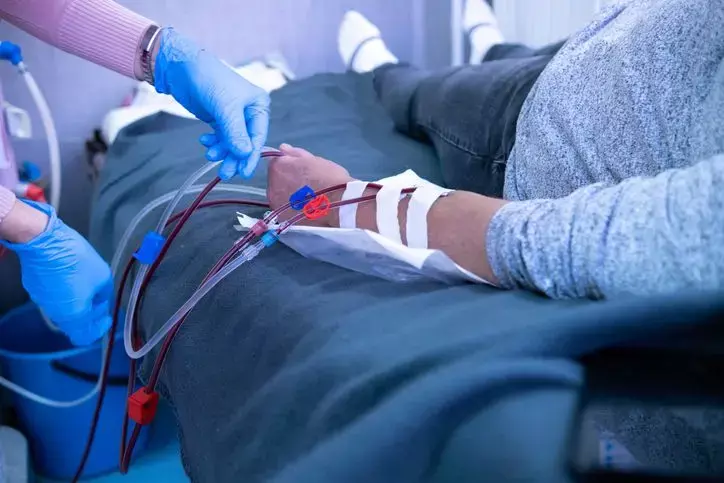- Home
- Medical news & Guidelines
- Anesthesiology
- Cardiology and CTVS
- Critical Care
- Dentistry
- Dermatology
- Diabetes and Endocrinology
- ENT
- Gastroenterology
- Medicine
- Nephrology
- Neurology
- Obstretics-Gynaecology
- Oncology
- Ophthalmology
- Orthopaedics
- Pediatrics-Neonatology
- Psychiatry
- Pulmonology
- Radiology
- Surgery
- Urology
- Laboratory Medicine
- Diet
- Nursing
- Paramedical
- Physiotherapy
- Health news
- Fact Check
- Bone Health Fact Check
- Brain Health Fact Check
- Cancer Related Fact Check
- Child Care Fact Check
- Dental and oral health fact check
- Diabetes and metabolic health fact check
- Diet and Nutrition Fact Check
- Eye and ENT Care Fact Check
- Fitness fact check
- Gut health fact check
- Heart health fact check
- Kidney health fact check
- Medical education fact check
- Men's health fact check
- Respiratory fact check
- Skin and hair care fact check
- Vaccine and Immunization fact check
- Women's health fact check
- AYUSH
- State News
- Andaman and Nicobar Islands
- Andhra Pradesh
- Arunachal Pradesh
- Assam
- Bihar
- Chandigarh
- Chattisgarh
- Dadra and Nagar Haveli
- Daman and Diu
- Delhi
- Goa
- Gujarat
- Haryana
- Himachal Pradesh
- Jammu & Kashmir
- Jharkhand
- Karnataka
- Kerala
- Ladakh
- Lakshadweep
- Madhya Pradesh
- Maharashtra
- Manipur
- Meghalaya
- Mizoram
- Nagaland
- Odisha
- Puducherry
- Punjab
- Rajasthan
- Sikkim
- Tamil Nadu
- Telangana
- Tripura
- Uttar Pradesh
- Uttrakhand
- West Bengal
- Medical Education
- Industry
Study identifies persistent lymphopenia as Key Predictor of In-Hospital Mortality in Immunocompromised CKD Patients

Researchers have found in new research that persistent lymphopenia is the most significant predictor of in-hospital mortality among immunocompromised chronic kidney disease (CKD) patients. Further in the study clinical prediction model incorporating persistent lymphopenia demonstrated strong diagnostic accuracy and clinical utility.
Immunosuppressive agents, although indispensable in the treatment of chronic kidney diseases (CKD), could compromise the patient’s immune function. The risk factor for in-hospital mortality in immunocompromised CKD patients with severe infections remain elusive. They conducted a retrospective analysis of the clinical data of CKD patients who received immunosuppressive agents and presented severe infections.
The cohort comprised 272 patients, among whom 73 experienced mortalities during their hospitalization. Logistic regression was employed on the training set to identify key feature variables and construct a predictive model for in-hospital mortality among immunocompromised CKD patients following severe infections. To facilitate clinical application, we constructed a nomogram to visually represent the predictive model.
Results: The findings indicate that ventilator use, vasoactive drug administration, elevated lactate dehydrogenase (LDH), total bilirubin (TBIL) levels, and persistent lymphopenia(PL) are effective predictors of in-hospital mortality in immunocompromised patients with severe infections. These variables were subsequently incorporated to construct a robust prognostic model.
Our model demonstrated excellent discriminative ability (AUC = 0.959, 95% CI, 0.924–0.994), significantly outperforming the Sequential Organ Failure Assessment (SOFA) score (AUC = 0.878, 95% CI, 0.825–0.930) and quick Pitt Bacteremia Score (qPBS) (AUC = 0.897, 95% CI, 0.846–0.947). Calibration curve analysis and the Hosmer-Lemeshow (HL) test corroborate the concordance of our model with empirical observations.
Furthermore, decision curve analysis (DCA) underscores the superior clinical utility of our predictive model when compared to the SOFA score and qPBS score. Most importantly, our results showed that PL is the most important predictor of in-hospital mortality in immunocompromised patients following severe infection. The findings highlight PL as the most significant predictor of in-hospital mortality in immunocompromised CKD patients. A clinical prediction model incorporating PL as a key variable exhibited robust performance in terms of diagnostic accuracy and clinical utility.
Reference:
Wang, Y., Zhou, Y., Huang, C. et al. Development of a prediction model for in-hospital mortality in immunocompromised chronic kidney diseases patients with severe infection. BMC Nephrol 26, 78 (2025). https://doi.org/10.1186/s12882-025-04002-9
Dr Kartikeya Kohli is an Internal Medicine Consultant at Sitaram Bhartia Hospital in Delhi with super speciality training in Nephrology. He has worked with various eminent hospitals like Indraprastha Apollo Hospital, Sir Gangaram Hospital. He holds an MBBS from Kasturba Medical College Manipal, DNB Internal Medicine, Post Graduate Diploma in Clinical Research and Business Development, Fellow DNB Nephrology, MRCP and ECFMG Certification. He has been closely associated with India Medical Association South Delhi Branch and Delhi Medical Association and has been organising continuing medical education programs on their behalf from time to time. Further he has been contributing medical articles for their newsletters as well. He is also associated with electronic media and TV for conduction and presentation of health programs. He has been associated with Medical Dialogues for last 3 years and contributing articles on regular basis.


